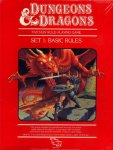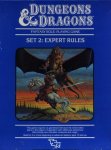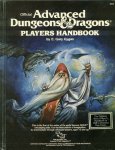Keldryn
Adventurer
We have some indication from the TSR catalogs of the early 90s. They report that the combined sales for Expert, Companion and Masters were around the 500,000 mark at the point the Rules Cyclopedia was announced. By contrast, the 2E core books sold around 250,000-300,000 each in their first year.
Not really perfectly comparable numbers. Core books often sell the heaviest early on, and I'd expect more than a 50k swing between PHs and the DM-only MM & DMG. It'd be helpful to break out the Expert set, at least, why isn't Basic mentioned, etc...
I'm honestly surprised that the Expert Set's sales weren't higher, given the robust support which it received. I would guess that the Expert Set probably accounts for 350k to 400k of that figure, considering how long it takes to advance through the levels and the usual attrition over time.
There is a thread on Dragonsfoot where Tim Kask states that, in reference to his assertion that the '83 Basic Set (red box, Frank Mentzer) was the best-selling D&D product of all time:
Sales figures are simply not available to the general public; neither WotC nor Hasbro will say, and TSR's records are unreliable.
So, I went to Jim Ward, who certainly was in a position to know, and he concurs with my assertion. Consider this, and I am paraphrasing Jim a bit: Frank's Red Box set was selling 100K copies per quarter, just in the US. Both the German and the Japanese editions of the Red Box matched those numbers for several years, plus the other 8 or 9 language editions were also being sold at that time. There are significant numbers of Europeans that see Frank as the father of role-playing because it was his name on the game they learned to play. (He clarified that at this year's RopeCon in Finland.)
So, if we assume those numbers for just three years, that means 1.2 million US, 1.2 million Japan and Germany, and then all of the rest will probably account for another 500 or 600K. That makes roughly 3 million just for those three years.
The sales of Classic D&D vs AD&D also seem to have been different in the US vs internationally. The Basic and Expert sets appear to have been translated into more languages than were the AD&D books.
That's a very compelling argument for me not having actually gone from the Basic set to the Advanced game. Of course, I did so in 1980, a year before the Expert Set hit the shelves, so it was either AD&D or the old booklets.
That isn't even remotely what I was arguing.
Consider a kid or young teen who begins playing D&D with this:

He loves the game and can't wait to play more, so he goes to the store to buy more D&D stuff. Looking through the large number of D&D products on the shelves, his most natural and logical next purchase is this:

Not three books like this:

You started with the original D&D Basic Set (Holmes, 1977), which was intended to introduce non-wargamers to D&D and then lead in to AD&D.
The second revision of the Basic Set (Moldvay, 1981) was designed to introduce non-wargamers to D&D and then lead into the Expert Set (Cook, 1981), which was released simultaneously. It was a complete game system that was more accessible and streamlined than AD&D. This version of D&D was deliberately positioned as a game where the action takes place in your imagination and not a board game nor a wargame.
I am going to refer to this version of D&D as "Classic D&D" from this point on. This term includes B/X, BECMI, and Rules Cyclopedia.
My entire purpose in bringing Classic D&D into the discussion was that this version of D&D is as much a part of 5e's lineage as is AD&D. While D&D had its origins in wargaming and these roots were still apparent in AD&D, by 1981 there was a complete game of D&D that intentionally dumped much of the wargaming baggage and was very playable in the "theater of the mind." This version of D&D remained in print (in one form or another) until 1996.
I then suggested that those of us who were introduced to D&D (and RPGs) through Classic D&D were probably more likely to view "theater of the mind" as the default style of play than were gamers who started with wargaming, OD&D, or AD&D 1e. Not a statement of fact, but an entirely reasonable hypothesis.
The 'two pronged approach' always was a little weird, though, I'll grant you.
It was weird, and probably would have been better to just have a streamlined "starter set" that was provided a complete play experience on its own but directed players towards the AD&D books for more options and higher-level play.
Basic and Expert together made for a very complete, playable, and streamlined game for a long time (levels 1-14 for fighter, magic-user, cleric, thief, elf, dwarf, halfling). The addition of the Companion and Masters rules (plus rules like skills form the GAZ line) added a lot of complexity to the game, and the publication of AD&D 2e made AD&D accessible enough that the Classic D&D game (as a whole) started to become redundant.
Of course, the primary reason for keeping two separate lines going was the legal dispute with Dave Arneson.


